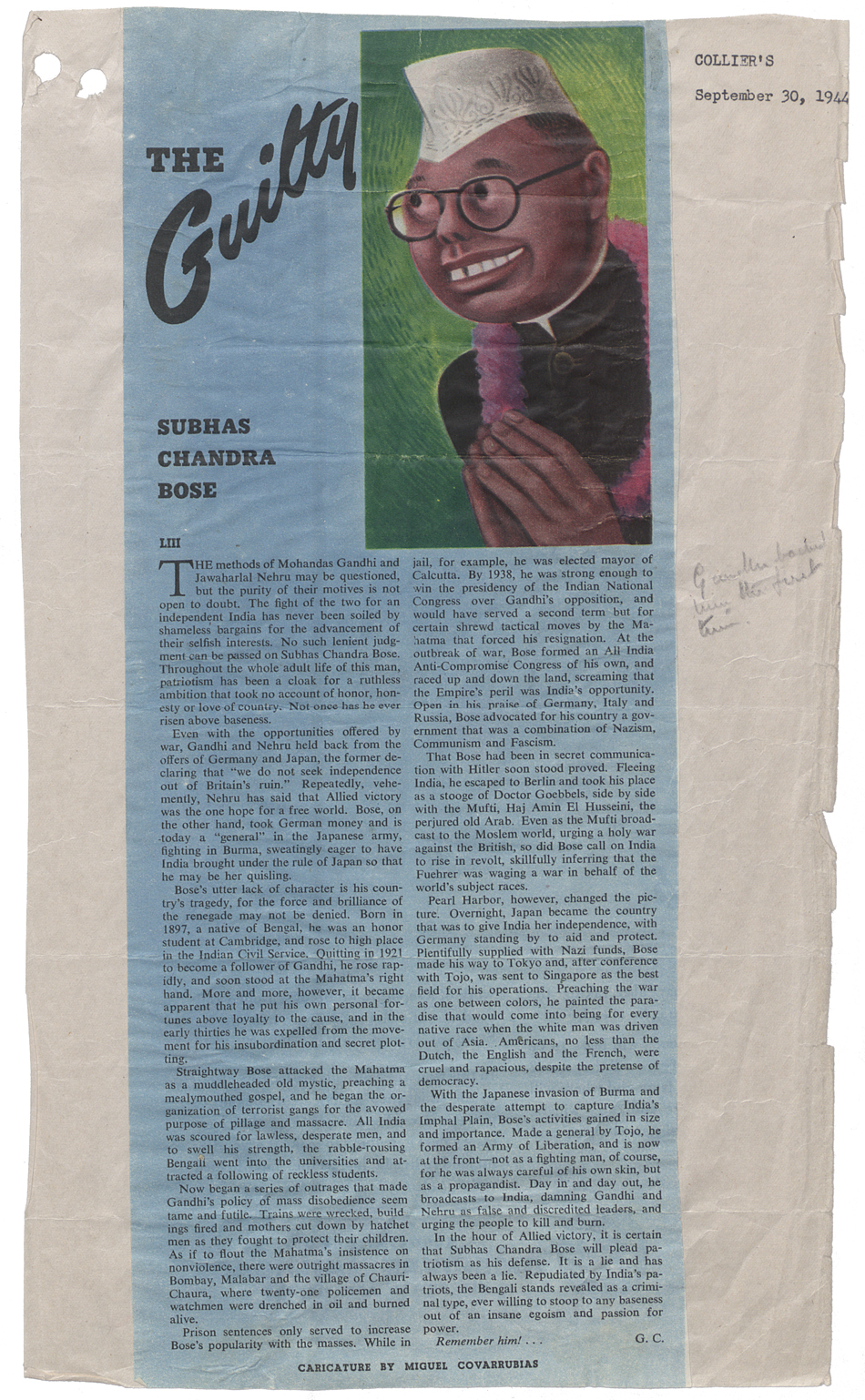Profile of Chandra Bose with caricature by Miguel Covarrubias, Collier’s Magazine 30th September 1944 (FO 371/41783)
Transcript
The Guilty
SUBHAS CHANDRA BOSE
LIII
The methods of Mohandas Gandhi and Jawaharlal Nehru may be questioned, but the purity of their motives is not open to doubt. The fight of the two for an independent India has never been soiled by shameless bargains for the advancement of their selfish interests. No such lenient judgement can be passed on Subhas Chandra Bose. Throughout the whole adult life of this man, patriotism has been a cloak for a ruthless ambition that took no account of honor, honesty or love of country. Not once has he ever risen above baseness.
Even with the opportunities offered by war, Gandhi and Nehru held back from the offers of Germany and Japan, the former declaring that “we do not seek independence out of Britain’s ruin.” Repeatedly, vehemently, Nehru has said that Allied victory was the one hope for a free world. Bose, on the other hand, took German money and is today a “general” in the Japanese army, fighting in Burma, sweatingly eager to have India brought under the rule of Japan so that he may be her quisling.
Bose’s utter lack of character is his country’s tragedy, for the force and brilliance of the renegade may not be denied. Born in 1897, a native of Bengal, he was an honor student at Cambridge, and rose to high place in the Indian Civil Service. Quitting in 1921 to become a follower of Gandhi, he rose rapidly, and soon stood at the Mahatma’s right hand. More and more, however, it became apparent that he put his own personal fortunes above loyalty to the cause, and in the early thirties he was expelled from the movement for his insubordination and secret plotting.
Straightaway Bose attacked the Mahatma as a muddleheaded old mystic, preaching a mealymouthed gospel, and he began the organization of terrorist gangs for the avowed purpose of pillage and massacre. All India was scoured for lawless, desperate men, and to swell his strength, the rabble-rousing Bengali went into the universities and attracted a following of reckless students.
Now began a series of outrages that made Gandhi’s policy of mass disobedience seem tame and futile. Trains were wrecked, buildings fired and mothers cut down by hatchet men as they fought to protect their children. As if to flout the Mahatma’s insistence on nonviolence, there were outright massacres in Bombay, Malabar and the village of Chauri-Chaura, where twenty-one policemen and watchmen were drenched in oil and burned alive.
Prison sentences only served to increase Bose’s popularity with the masses. While in jail, for example, he was elected mayor of Calcutta. By 1938, he was strong enough to win the presidency of the Indian National Congress over Gandhi’s opposition, and would have served a second term but for certain shrewd tactical moves by the Mahatma that forced his resignation. At the outbreak of war, Bose formed an All India Anti-Compromise Congress of his own, and raced up and down the land, screaming that the Empire’s peril was India’s opportunity. Open in his praise for Germany, Italy and Russia, Bose advocated for his country a government that was a combination of Nazism, Communism and Fascism.
That Bose had been in secret communication with Hitler soon stood proved. Fleeing India, he escaped to Berlin and took his place as a stooge of Doctor Goebbels, side by side with the Mufti, Haj Amin El Husseini, the perjured old Arab. Even as the Mufti broadcast to the Moslem world, urging a holy war against the British, so did Bose call on India to rise in revolt, skillfully inferring that the Fuhrer was waging a war in behalf of the world’s subject races.
Pearl Harbor, however, changed the picture. Overnight, Japan became the country that was to give India her independence, with Germany standing by to aid and protect. Plentifully supplied with Nazi funds, Bose made his way to Tokyo and, after conference with Tojo, was sent to Singapore as the best field for his operations. Preaching the war as one between colors, he painted the paradise that would come into being for every native race when the white man was driven out of Asia. Americans, no less than the Dutch, the English and the French, were cruel and rapacious, despite the pretense of democracy.
With the Japanese invasion of Burma and the desperate attempt to capture India’s Imphal Plain, Bose’s activities gained in size and importance. Made a general by Tojo, he formed an Army of Liberation, and is now at the front-not as a fighting man, of course, for he was always careful of his own skin, but as a propagandist. Day in and day out, he broadcasts to India, damning Gandhi and Nehru as false and discredited leaders, and urging the people to kill and burn.
In the hour of Allied victory, it is certain that Subhas Chandra Bose will plead patriotism as his defense. It is a lie and has always been a lie. Repudiated by India’s patriots, the Bengali stands revealed as a criminal type, ever willing to stoop to any baseness out of an insane egoism and passion for power.
Remember him!…
G.C.
